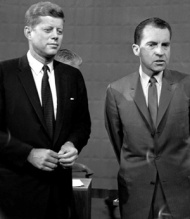
First presidential debate, 1960
The first televised presidential debate set a standard for American politics.
A myth-encrusted standard.
John F. Kennedy supposedly won that debate in September 1960 because he looked so much more rested and telegenic than his rival, Richard M. Nixon. There is, however, scant evidence to support that notion, which was revived yesterday in a commentary at the Daily Caller blog.
The commentary suggested that Newt Gingrich’s beleaguered presidential campaign might find a spark during tonight’s debate in New Hampshire among seven Republicans seeking the presidency.
In 1960, the Daily Caller commentary stated, “then-Sen. John F. Kennedy reportedly spent the day of his big debate against Vice President Richard Nixon getting a sun tan and resting. Nixon, on the other hand, spent the day rigorously campaigning (he also didn’t wear makeup). It worked for Kennedy who, thanks to the advent of TV, ‘won’ the debate. A rested Gingrich might likewise perform well in Monday’s debate in New Hampshire.”
Gingrich’s hopes to win the presidency probably were destroyed with last week’s mass departure of top campaign staffers and advisers. But his long-shot candidacy is of scant interest to Media Myth Alert. Far more compelling is the Daily Caller’s claim about the presidential debate in September 1960.
It’s important to note that most commentary in the debate’s immediate aftermath called the Kennedy-Nixon encounter a draw.
For example, James Reston, then the Washington bureau chief for the New York Times, wrote in a post-debate column: “Who took the first round is a matter of individual opinion. My own view is that Kennedy gained more than Nixon, but it was a fielder’s choice, settling nothing.”
The Washington Post, on the other hand, said in a post-debate editorial:
“Of the two performances, Mr. Nixon’s was probably the smoother. He is an accomplished debater with a professional polish, and he managed to convey a slightly patronizing air of a master instructing a pupil.”
The St. Louis Post-Dispatch hedged in its assessment, declaring: “We should not say that anybody won. … They both looked pretty young to us.”
Immediately after the Kennedy-Nixon encounter, the Associated Press conducted an unscientific survey in 10 major U.S. cities and reported that most respondents said they hadn’t been influenced by the exchanges. “Only a few persons,” according to AP, “said they had actually switched from one candidate to the other because of the debate.”
In the months afterward, Nixon’s sweaty brow and haggard appearance during the debate emerged as factors supposedly decisive to the outcome of the encounter — and to the 1960 election. Such claims, however, rest on more on conjecture than compelling evidence.
David L. Vancil and Sue D. Pendell wrote in a revealing journal article published in 1987 that “the inference that appearance problems caused Nixon’s loss, or Kennedy’s victory [in the debate], is classic post hoc fallacy.
“Appearance problems, such as Nixon’s perspiring brow, could have had a negative impact on viewer perceptions, but it is also possible for viewers to be sympathetic to such problems, or to interpret them as evidence of attractive or desirable qualities.”
That is, Nixon’s sweating under hot television lights could have stirred viewers empathy, making them feel more kindly toward the Republican candidate. It’s a plausible supposition.
Vancil and Pendell also wrote:
“Even if viewers disliked Nixon’s physical appearance, the relative importance of this factor in viewers’ selection of a debate winner is a matter of conjecture.”
A Gallup poll conducted during the week following the debate and released October 11, 1960, reported that 43 percent of voters thought Kennedy “did the better job” in the debate, which was the first of four during the 1960 fall campaign. Twenty-three percent thought Nixon was better; 29 percent said both candidates were about the same. Five percent offered no opinion.
But the poll did not specifically address the appearance of either candidate; nor did the poll detect a sharp swing of support to Kennedy. The survey reported Kennedy to be narrowly ahead, by 49 percent to 46 percent, with 5 percent undecided.
That result represented a slight change from a Gallup survey taken just before the debate, which reported Nixon leading by 47 percent to 46 percent.
But Gallup termed the post-debate shift too slight to be meaningful.
“The prudent reader can see,” George Gallup, head of the polling organization, stated in reporting the results, “that polling accuracy has not reached the degree of accuracy required to say with certainty which candidate is ahead in a close race such as the present one.”
By the way, Kennedy didn’t take off the day of the debate to rest and work on his tan, as the Daily Caller commentary said. The Chicago Tribune reported that Kennedy received “a boisterous welcome” in an appearance that afternoon at a carpenters union convention in Chicago, the debate’s host city.
WJC
Recent and related:


 “Fake news” has plenty of antecedents in mainstream media — several cases of which are examined in my mythbusting book,
“Fake news” has plenty of antecedents in mainstream media — several cases of which are examined in my mythbusting book,  fiercely in the ambush of her unit during the early days of the Iraq War in 2003. Lynch, the
fiercely in the ambush of her unit during the early days of the Iraq War in 2003. Lynch, the 
 As I discuss in my media-
As I discuss in my media-
 “Even the oblique hints of viewer-listener disagreement were vague and few,” I write, adding:
“Even the oblique hints of viewer-listener disagreement were vague and few,” I write, adding: A better way to put it is that it offers up a hoary media myth. That at least was a fundamental flaw of last night’s first installment of the quasi-documentary series known as “
A better way to put it is that it offers up a hoary media myth. That at least was a fundamental flaw of last night’s first installment of the quasi-documentary series known as “


